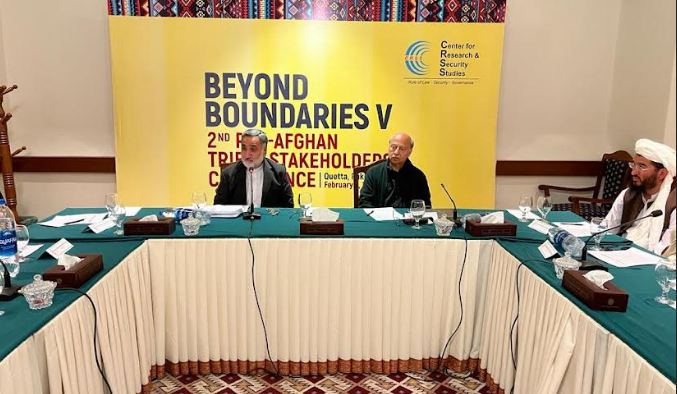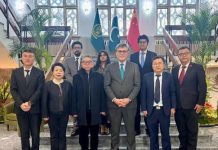ISLAMABAD, FEB 10: /DNA/ – The Pak-Afghan Chaman border has seen rampant turbulence and chaos in the past few months. Cross-border firing incidents and prolonged closure have not only disrupted the peace on both sides but also impeded business and public mobility, thus remain a chief cause of acrimony between two sides.
The need to cooperate and resolve these cross-border issues reverberated at the 2nd Pak-Afghan Tribal Stakeholders Conference in Quetta, Pakistan, hosted by the Center for Research and Security Studies (CRSS) in collaboration with Afghanistan based Organization for Economic Studies and Peace (OESP), as part of Beyond Boundaries – a Pak-Afghan Track 1.5/ II initiative that aims to improve relations between the two countries and enhance people-to-people contacts.
The fora comprised Pakistani and Afghan tribal leaders, chieftains, and community influencers from Chaman, Qandahar, and nearby areas. Discussions were held on bilateral cooperation and coordination, economic connectivity, refugee influx, human rights, and socioeconomic development of the border regions. The issue of Afghan girls’ education was also discussed thoroughly.
Participants underlined the closure of the Chaman border is causing socio-political and security challenges for natives on both sides such as poor standard of living, inflation, and life threats during their movement between two sides.
To avert crossfire incidents in the future, the participants suggested sensitizing the border authorities and paying special heed to address the trigger-happy- tendencies of security personnel deployed at the crossing points.
The participants from both sides shared consensus on how the border impediments affect bilateral relations on the state and people-to-people level. People face a lot of difficulties for personal and business cross-border visits due to the unnecessarily long and redundant legal procedures.
Tribal leaders from Pakistan argued that Islam has stressed the pursuit of knowledge for both men and women and, therefore, there should be no problem in allowing girls to attain education under the Islamic Emirate of Afghanistan (IEA). On the other hand, the Afghan side noted that the quality of education is poor in their country – it does not guarantee a promising future even for men. “So, we do not see any hope for our daughters either – what we need is an overall improvement of the educational infrastructure and living standards”, said a tribal leader from Qandahar.
Emphasis was made on ameliorating the economic situation on both sides because the local currencies have been depreciating, causing a massive setback to both economies. The participants suggested that border routes should not only serve as trade routes but a conduit of connectivity and cooperation.
“We should develop the economic participation potential of our people to improve our workforce. The apparatus is there, but sadly people in this region have either been forsaken or not considered worthy enough of participation in the transnational endeavors to improve the fiscal stability”, said an attendee.
Lastly, the participants emphasized that the only solution for regional peace is addressing the recurrent difficulties of and common misperceptions of natives of the bordering areas and recommended the formation of a committee comprising tribal stakeholders from both sides – which shall convene occasional meetings to discuss and devise solutions against the prevailing issues of governance, trade, economy, and security in the region. Such a committee should be led by CRSS as a relevant track 1.5/ 2 actor to strengthen the intergovernmental efficacy of the fora and increase the prospects of people centric policymaking.












